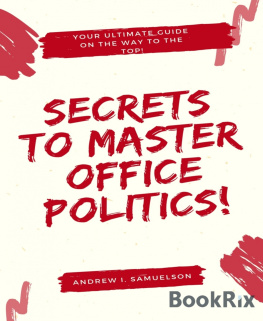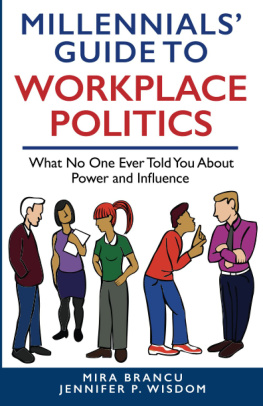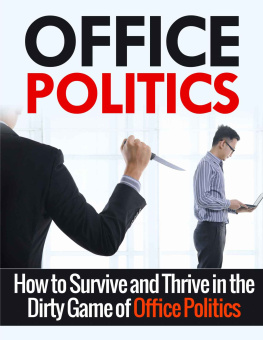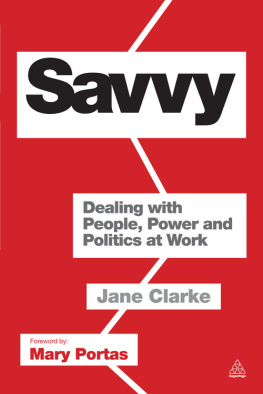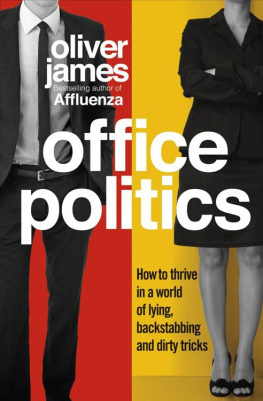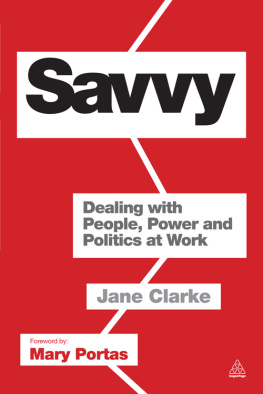The author and publisher have provided this e-book to you for your personal use only. You may not make this e-book publicly available in any way. Copyright infringement is against the law. If you believe the copy of this e-book you are reading infringes on the authors copyright, please notify the publisher at: us.macmillanusa.com/piracy.
Several years ago, another consultant and I invited a mutual client, a man whom we shall call Todd, out to lunch. Our hope was that we could keep him from destroying his career. Todd was an extremely bright, capable executive with a clear and inspired vision for his organization. He had a true passion for his work and a great desire to do good things in the world. The problem, however, was that he had gotten completely sidetracked by his intense animosity toward his boss, embarking on an obsessive quest to get this man fired. As outside observers, my colleague and I could readily see that, if this war continued, the inevitable outcome would be Todds own termination. Todd, however, could not see this at all. So, as we ate our sandwiches, the two of us tried to help Todd view the situation more clearly. No luck. Todd spent the entire lunch ranting about his bosss failings and the general unfairness of his circumstances. As we predicted, Todd was soon looking for another job. Many people experience difficulties at work because they do not accurately read their environment or correctly anticipate the consequences of their actions. Unlike Todd, however, most of them are able to correct the situation oncethey understand the problem. That is why I decided to write this book.
Work is truly a critical component of happiness. Unlike the other creatures on the planet, people need to have a purpose. Those whose lives lack meaning feel lost and often drift into harmful, self-destructive activities. Meaningful work may be paid or unpaid, inside or outside the homebut for many of us, our sense of purpose is connected to our jobs. Unfortunately, if people lack clear goals, have unpleasant working relationships, or simply dont understand how organizations operate, the joy of accomplishment is often replaced by frustration and disappointment. When people fail to master the political side of work, their jobs may become unrewarding and unhealthy.
DISCOVERING MY OWN PURPOSE
Some people find their purpose in life quite early. From the time he was twelve, my high school boyfriend was operating a radio transmitter in his house, from which he broadcast to the neighborhood. He now owns a radio station. Others find a new mission later in life. My multitalented husband discovered a gift and passion for songwriting in his forties. And some of us have a purpose that we may not immediately recognize. Although I always felt my jobs were meaningful, I didnt see the pattern in my own work until I had been employed for many years.
Earlier in my career, I occupied a variety of roles: helping people with disabilities find employment, resolving disputes between employees and managers, counseling people who had lost their jobs, teaching managers to be more effective leaders, encouraging communication between executives and the workforce. I spent more time in institutions of higher learning than any sane person probably should, acquiring degrees in psychology, counseling, and management. During those years, I was a counselor, trainer, manager, and human resources director. I worked in business,government, and not-for-profit organizations. For a long time, I viewed these experiences as simply a collection of different jobs, the natural result of my desire to always be learning and doing new things.
When I decided to return to graduate school to get a Ph.D., I spent some time exploring what I really wanted to do. That was when I realized that the common theme throughout my career has been the connection between people and work. My own purpose, I believe, is to help others find greater rewards in their work and overcome any obstacles that are getting in the wayincluding their own behavior. During my exploration of various graduate programs, one professor posed an interesting question. If you could accomplish anything with your life, what would it be? he asked. Reflecting back on my career to that point, I replied, Actually, I wish that I could help people understand how organizations operate and help organizations understand how people operate. It seemed like an unrealistic aspiration at the time, but now thats exactly what I do.
THE PREVALENCE OF POLITICS
Since leaving the employ of others, I have operated my own consulting business, working with a wide variety of organizations. My clients have included companies in telecommunications, retail, food processing, insurance, advertising, accounting, pharmaceuticals, consulting, software, manufacturing, transaction processing, and health care. I have also worked with many government agencies (local, state, and federal) and not-for-profit organizations.
Despite the diversity of settings in which I work, the same issues arise with remarkable consistency. Here are a few of the people that I encounter on a regular basis:
A confused and anxious employee who is not sure exactly what is expected by management
A tired and angry person who is clearly in the wrong job
A frustrated manager who does not know how to deal with a poorly performing employee
People at all levels who feel that their boss is incompetent, unfair, or unreasonable
Colleagues who have constant disagreements because of drastically different work styles
Entire departments at war with each other because of conflicting roles
Many, many people who feel that they are somehow being treated unfairly
All these unhappy folks are, in one way or another, dealing with political dilemmas. When you view office politics not as a Machiavellian plot, but as a normal aspect of work that needs to be managed, you quickly realize that political ability is a fundamental component of success in any job. Political topics are seldom discussed openly, however. At work, it is usually not appropriate to mention that you are furious with your boss, angling for a promotion, afraid of a colleague, or worried about your future. So people suffer in silence, feeling helpless to deal with their political predicaments and growing increasingly frustrated.
THE NEED FOR POLITICAL MENTORING
Through my consulting work, I have helped many employees, managers, and executives figure out how to handle their personal political challenges. My clients are not screwups or troublemakers, but competent and successful people wrestling with stressful issues that are difficult to resolve. Simply talking about these problems is often a great relief for them. In our confidential conversations, they can freely express their frustration with dysfunctional bosses, career uncertainties, challenging staff members, derailed projects, or obstructive colleagues. Listening totheir difficulties, I have come to fully appreciate how much our mental and physical well-being is affected by what happens on the job.
For some, the answer to their political dilemma is as simple as shifting their expectations, taking time to consider a different point of view, or having a focused discussion with a colleague. For others, the solution may require some serious self-examination and a change in long-standing behavior patterns. In either case, a political mentor can serve as a sounding board and offer a different perspective on the situation. This is frequently my role with clients. In writing this book, my goal is to provide the same assistance for readers: to help them view their circumstances differently, keep them from becoming their own worst enemy, and suggest some new strategies and approaches.


